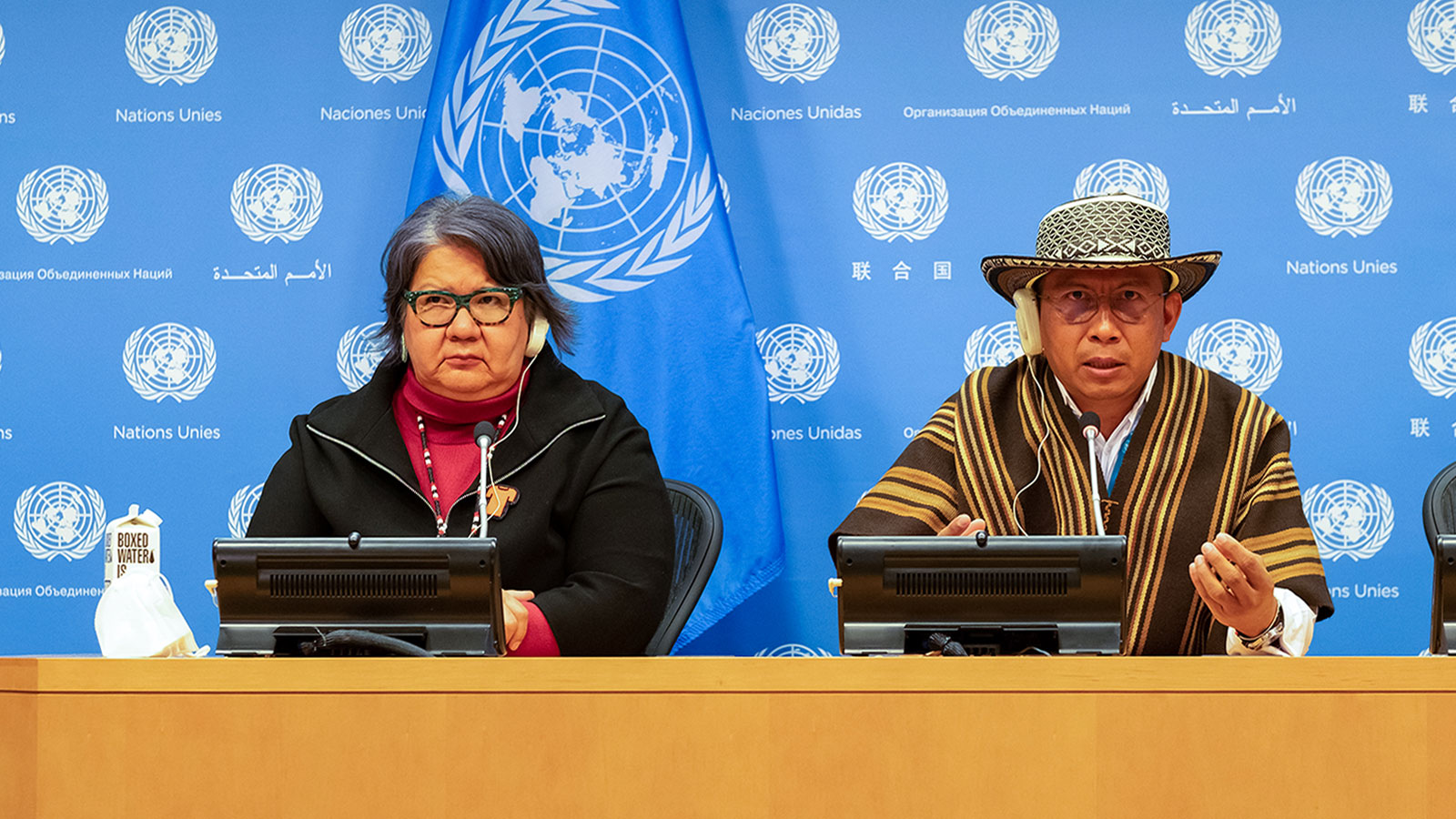This story is published as part of the Global Indigenous Affairs Desk, an Indigenous-led collaboration between Grist, Indian Country Today, and High Country News.
In 2020, construction of Fosen Vind, an onshore wind energy complex, was completed on Norway’s central coast. The 151 turbines make up one of Europe’s largest onshore wind complexes, but Indigenous Sami peoples in the area say that the wind farm is encroaching on their lands, endangering their reindeer herds, and threatening their way of life. Silje Karine Muotka, President of the Sami Parliament of Norway, says that the situation is an example of how Indigenous rights are being violated in favor of renewable energy projects. “The so-called green shift can take the form of green colonization,” she said.
Indigenous leaders say that Norway and other countries need stricter enforcement and application of free, prior, and informed consent, or FPIC. FPIC is a right that is recognized by international standards like the UN Declaration on the Rights of Indigenous Peoples (UNDRIP) and the International Labor Organization Convention, and applies to relocation, culture, legislation, land use, and the environment. Under international law, countries have an obligation to obtain the free, prior, and informed consent of impacted Indigenous communities in all of these areas. FPIC is recognized as the gold standard for respecting Indigenous rights, as it is designed to create a comprehensive and culturally appropriate consultation process for any activities that affect Indigenous peoples. But while over one hundred countries have adopted UNDRIP, including the United States, Indigenous leaders say that FPIC is not being adequately enforced or applied.
“Although the rights of Indigenous peoples to self determination, land, territory resources and free, prior and informed consent are guaranteed under international law including in business contexts,” said Darío José Mejía Montalvo, Zenú from Colombia and the new chair of the Permanent Forum, “rights are not recognized or applied effectively in many countries.”
Although many provisions of UNDRIP also face a serious lack of enforcement around the world, FPIC is an essential right that Indigenous leaders want the international community to focus on. This week, Indigenous leaders at the United Nations Permanent Forum on Indigenous Peoples will push for stronger international frameworks to support the application of FPIC.
Hindou Oumarou Ibrahim, a forum vice-chair and Indigenous Mbororo woman from Chad, says that in the midst of the global climate crisis, FPIC is more important than ever. Pointing to examples like the wind farm in Norway, she says that governments and corporations are continuing to violate Indigenous rights to build their energy projects. “They think that it is a solution for climate, but those are false solutions,” she said.
Throughout the session, Ibrahim said that she hopes that the forum can develop strong recommendations for other U.N. bodies and member states, as well as mechanisms to monitor member states’ national policies and programs. According to Ibrahim, some countries just mention FPIC without actually applying it. “FPIC is not only a principle,” she said. “For Indigenous peoples it is a right.”

The World Bank, hypothetically, could institute a policy whereby it only funds projects in countries maintaining clear FPIC regulations. In addition to national level recommendations, these are the kinds of policies that Ibrahim hopes the forum will develop during this session.
Majo Andrade Cerda, a Kichwa member of the Global Indigenous Youth Caucus from Ecuador, said that her peoples’ territory is threatened by gold mining projects. The country, she observed, needs a significantly stronger application of FPIC to defend Indigenous land and rights. “When you have FPIC programs and you respect that right, you are respecting our autonomy and how we decide to live,” she said.
Developing those programs will be a challenge that requires direct input from Indigenous communities. “We have to reinforce the idea that FPIC has to be done with intercultural points of view,” she said.
Cerda also stressed the difference between consultation and consent — consultation only requires nations to notify Indigenous communities of their actions; consent requires their active approval. Her hope is that Ecuador and other countries will look to the standard set by the UNPFII and other U.N. bodies to develop their own strong FPIC laws, rather than writing weaker versions that only require consultation.
Last year, in the U.S., Raúl M. Grijalva, Chair of the House Committee on Natural Resources, introduced the Requirements, Expectations, and Standard Procedures for Effective Consultation with Tribes (RESPECT) Act, which would be the first law to require federal agencies to consult with tribes on activities that would impact them.
Fawn Sharp, President of the National Congress of American Indians and Vice President of the Quinault Indian Nation, believes that broad policies like the RESPECT Act are important because they hold governments to a high standard in interactions with all tribes. However, she also said that there need to be provisions within these laws that give Indigenous communities options to dictate those consultations based on their needs and traditions. “It should be a general process that will work and that’s enforceable, but then flexible enough to ensure that each sovereign nation and its protocols are respected,” she said.
Sharp also said that a meaningful application of FPIC will require the United States to treat tribal nations as equals. “If we’re going to have meaningful consultation, we have to have political equity, which means there’s an equal bargaining position,” Sharp said. “The United States can’t just consult, check the box, then proceed with unilateral action.”
Another key part of the process is a mechanism that Indigenous groups can turn to when a project proceeds without their consent. Sharp believes UNPFII is an opportunity to learn from international examples of what that dispute resolution mechanism might look like.
Jose Proaño, co-director of Land is Life, is working directly with Indigenous communities in South America to develop the type of frameworks Cerda and Sharp describe. Proaño says that Indigenous communities already have their own established practices for decision making. FPIC is merely a way of providing a procedure to help the government engage with them. “The protocol is just a framework of what has been happening in this territory for thousands of generations,” he said.
Those procedures also help to guide governments on how to respectfully and appropriately communicate with Indigenous groups. In the past, he says, corporations and governments have done insufficient and disrespectful consultation processes. “It’s not consultation,” he said. “It’s just like a check mark.”
Silje Karine Muotka says that as the world moves towards greener energy sources, it needs to listen to Indigenous peoples, rather than continue to violate their rights and land. “You can’t camouflage the policies that we have endured for so long with global warming and lack of biological diversity,” she said. “If you are going to solve the main problem, then you must take another direction.”
Last year, the Sami scored a legal victory when Norway’s Supreme Court said the Fosen Vind project farm was violating their rights. But months later, the turbines are still there. Muotka says this is a clear example of why FPIC needs legally enforceable protections. “The path forward is to find better mechanisms,” she said.



